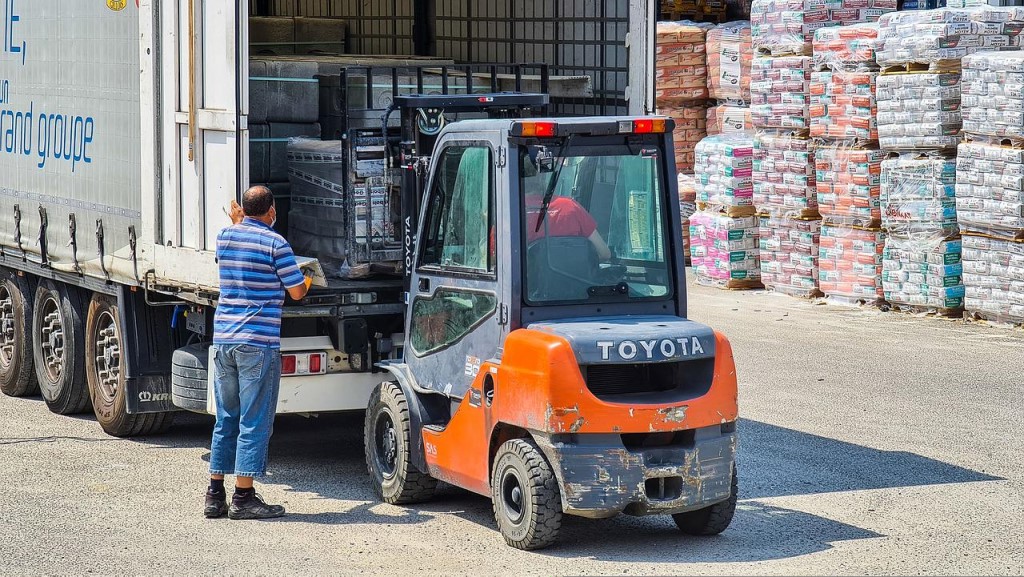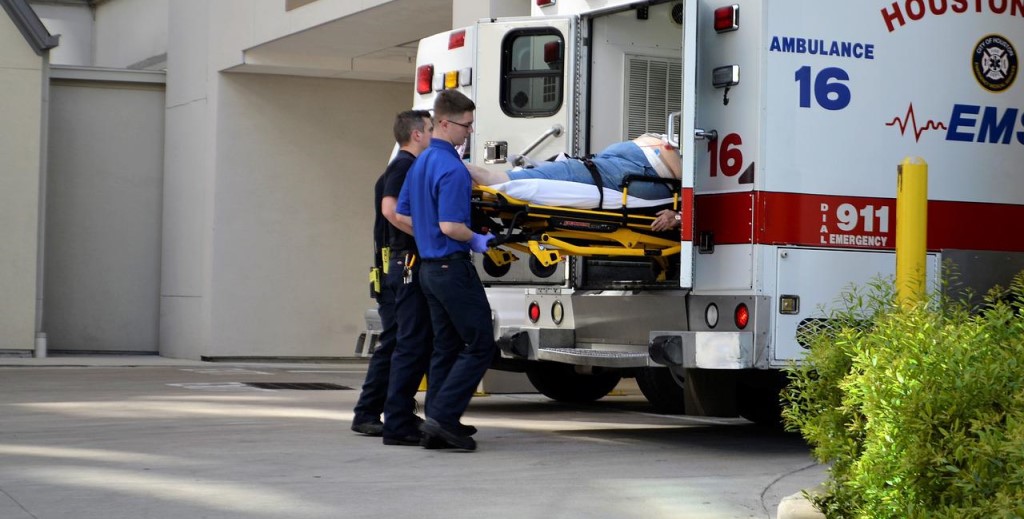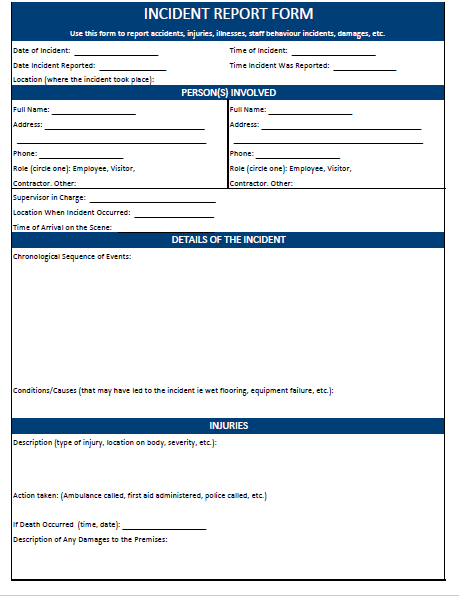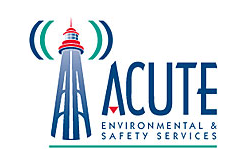There are several different types of incident reports in the workplace including near misses, injuries resulting in lost time, exposure incidents, and sentinel incidents. Click on each section below to learn more:
- Types of Incident Reports
- Purpose of Incident Reports
- Types of Information Included on Incident Reports
If you are looking for professional health and safety training, contact us.

There are different types of incident reports in the workplace
Incident Reports
1. Types of Incident Reports
There are many different types of incidents that can occur in your workplace that may need to be reported. Here is a list of the different types with examples of the type of incidents that might take place.
These include:
Near Misses:
Near misses refer to incidents that take place in your workplace where no one is injured. However, if the situation were slightly different, someone could have been injured. You may be tempted to ignore these types of incidents and decide not to report them, but it is important that you do. Reporting near misses can help to address issues that could potentially harm other workers.

A near miss could include slipping but not falling on a greasy surface
Near misses could include:
- A pedestrian who is nearly struck by a forklift that comes around a blind corner
- A worker who slips on a greasy floor, but doesn’t fall
- A hazardous waste container that wasn’t properly sealed immediately
Injuries Resulting in Lost Time:
This type of incident reporting include any type of injury that a person receives which result in them lost time on the job. These types of incidents could be the result of improper training, not wearing the proper personal protective equipment, or even carelessness.

A back injury could result in lost time
Possible examples of injuries resulting in lost time could include:
- A worker falling down slippery stairs and breaking a leg
- A worker failing to wear their hard hat and receiving a blow to their head that results in a concussion
- A healthcare worker that incorrectly lifts a patient and pulls a muscle in their back
Exposure Incidents:
Exposure incidents refer to people being exposed to harmful substances in the workplace.

An exposure incident could happen when a person comes to work with COVID
Possible examples of exposure incident could include things like:
- Carbon monoxide being detected in the building
- A facility where asbestos has been found
- A worker coming to work who has tested positive for COVID-19
Sentinel Events:
Sentinel incidents refer to serious accidents or extreme events in the workplace that result in permanent injuries or even death.

A sentinel event could include a worker falling from a height with the proper equipment
Some examples of sentinel events that could take place include:
- A worker falling from scaffolding who wasn’t wearing the proper fall arrest equipment for the height
- A forklift operator who is seriously injured when their forklift tips over
- A worker who loses a limb while operating equipment incorrectly
2. Purpose of Incident Reports
Incident reports are used to record accidents, injuries, illnesses, staff behaviour incidents, damages and other workplace events. It is important to fill out an incident report as soon after it happens as possible, while it is fresh in your mind.
In addition to recording workplace incidents, an incident report can also be used to:
- Determine the possible causes of the incident
- Document any actions taken regarding the incident
- Indicate potential risks and uncontrolled hazards in the workplace
Incident reports are important tools for reporting accidents
If you are an employer covered by the Occupational Health and Safety Act (OHSA) you may need to report to the Ministry of Labour, Immigration, Training and Skills Development if there has been a workplace incident or illness, including those resulting in:
- Death
- Injury
- Occupational illness
An incident report can be a valuable tool in any type of reporting that you need to do.
3. Types of Information Included on Incident Reports
Here is a list of some of the most important information that you should include in your incident report.
Dates, Times, and Place:
Record both the date and time of the incident and the date and time that the report was filled out. You should also include the location where the accident took place.
People Involved:
List the full names and contact information of the people involved including their address and phone number. You should also indicate their role i.e. employee, visitor, contractor, or other. You should also include the name and contact information of the supervisor in charge of the area. List where they were and when they arrived on the scene as well.
Conditions and Causes:
Describe any conditions that might have led to the accident. For example, was the ground icy or slippery, was ther a loose floorboard, etc. You should also state what caused the incident and if anyone else was involved.
Sequence of Events:
Outline exactly how the accident happened. It is helpful to set this out in a chronological timeline.

Record witness statements including their contact information
Description of Injuries:
Give a complete description of any injuries that occurred including the location of the injuries on body and the severity. If a death resulted from the incident, record the time and date.
Action taken:
Make a list of any actions taken. For example, if an ambulance called, if first aid was administered, or if the police were called, record this.
Damages:
Give a description of any damages to the premises or surroundings that resultedin the incident.
Witness Statements:
Include the names and contact information for any witnesses to the even along with their complete statements of what they saw.
Plan of action:
Give a description of any actions taken already or actions to be taken as a result of the incident.
Free Incident Report Form
Fill Out the Form Below to Download Your FREE Incident Report Form Now!
*Note:
By filling in the form you will be added to our bi-monthly email that will inform you of upcoming training courses and other helpful health and safety information.
You can unsubscribe from this email at any time.

Why Choose ACUTE for Your Workplace Health and Safety Training
Hands-on, practical training is the best way to keep employers and workers safe in the workplace! ACUTE is dedicated to workplace safety and understands the importance of course and training provider approval.
Why get workplace safety training with ACUTE?
Here are just some of the benefits of working with ACUTE:
- Open Door Instructor-Student Partnership – ACUTE’s training services emphasize client participation, staff foster relationships with clients, and serve as a touchstone for advice anytime moving forward.
- Serving Your Team and Industry – With a vast array of clients in manufacturing, construction, health, academic, and government sectors, ACUTE brings the best safety practices from across the spectrum to your workplace.
- 100 Years Combined Experience – ACUTE provides comprehensive health and safety training, on-site safety services, and consulting services. With over 100 years of combined experience, our company staff offers more than theoretical or abstract ideas. ACUTE offers solutions!
- Track Record of Success – ACUTE has rated 4.9/5 stars on Google reviews, demonstrating a commitment to our clients, quality, and passion for training.
Hours of Operation
Monday – Friday: 8:00am-5:00pm
Saturday – Sunday: Closed

What Our Customers Are Saying…
Acute is recognized and respected as a people organization and they have been doing it right for a long time.
Acute has been a staple in supporting my companies over the years and have always delivered quality amd dependable service. Training programs are top shelf and a great facility for practical application. couldn’t recomend them more. keep up the great work folks.
We were referred to ACUTE on behalf of our employer for an n95 mask fitting – the staff here are professional, personable, and informative.
I’d come back here for any safety-related training in a heartbeat.

